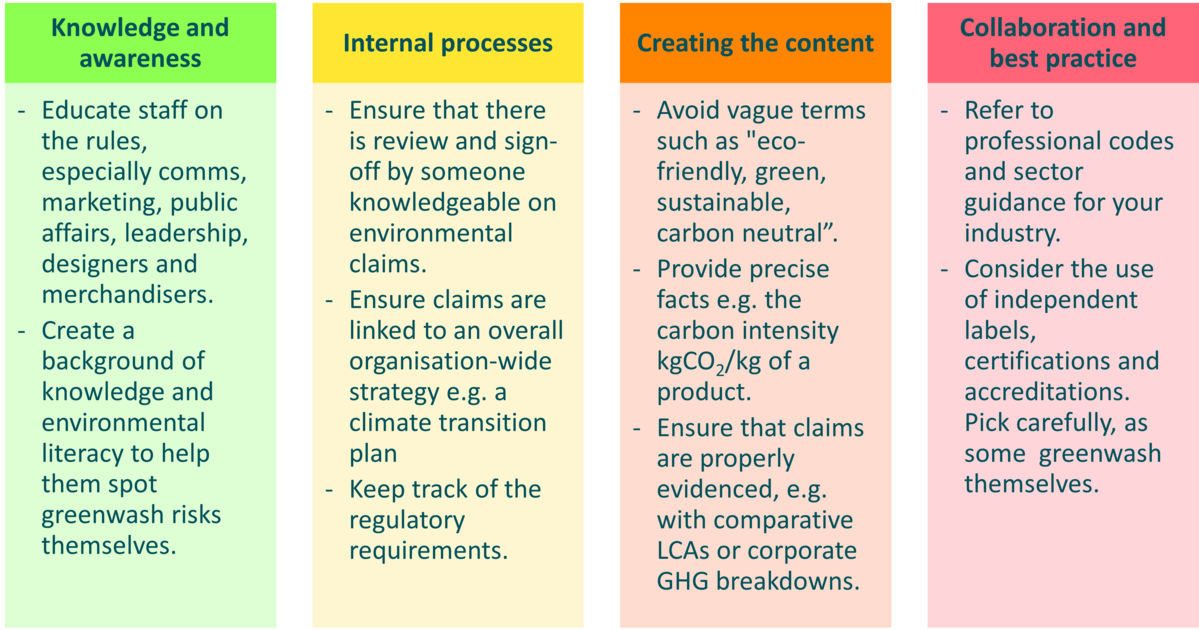Regulators take aim on greenwashing

Greenwashing has real world impacts and regulators are increasingly clamping down. This article takes a look at the latest developments and what companies can do to avoid the risk of being accused of greenwashing, whilst not going to the other extreme of ‘green hushing’ and staying mute on environmental issues.
What is greenwashing?
“Greenwashing” is a term for misleading claims about environmental performance of a product, service or organisation. The term was first used in the 1980s (https://www.theguardian.com/sustainable-business/2016/aug/20/greenwashing-environmentalism-lies-companies) but since 2021, the UK Competition Markets Authority (CMA) and the Advertising Standards Agency (ASA) have issued guidance on environmental claims which are likely to be misleading and therefore not allowed under consumer protection law. Regulators around the world are taking similar steps, reflecting the growth in environmental concerns among consumers and consequently increasing marketing of the environmental credentials of products.
What rules govern greenwashing?
The CMA’s ‘Green Claims Code’ and ASA’s 2021 guidance explains how companies should interpret their existing legal requirements under consumer protection law. This is to ensure that companies’ communications allow consumers to make informed choices, on the basis of true, accurate and complete information which isn't misleading.
The Financial Conduct Authority’s (FCA) is introducing an anti-greenwashing rule on 31st May 2024. This is specific to financial products and services to ensure consumers who invest in sustainability-related financial products can make informed decisions. To quote the guidance:
"We introduced the anti‑greenwashing rule to clarify to firms that sustainability‑related claims about their products and services must be fair, clear and not misleading. It gives us an explicit rule on which to challenge firms if we consider they are making misleading sustainability‑related claims about their products or services and, if appropriate, take further action" 1
The rule is part of the FCA's Sustainability Disclosure Regulations (SDR) and is designed to support the correct functioning of financial markets, by promoting reliable information for investors on companies’ environmental risks and opportunities.
There is also the EU Green Claims Directive, which is due to be transposed to the 27 member states’ legislative books in coming years. The US Federal Trade Commission’s Green Guides have a similar aim.
What is the impact of greenwashing?
The main risk of being accused of greenwashing are the reputational and brand damage, the consequences of which could be financially material: loss of business relationships including procurement contracts, sustainability linked investments and partnerships. We are also seeing an increase in legal action from advertising regulators or private groups on behalf of consumers. Aside from the reputational damage, this can result in needing to pay damages if a legal case finds harm as a result of misleading claims.
More widely greenwash erodes societal trust in corporate environmental action and the real environmental progress that the companies may be making.
There have been dozens of examples of reputational damage through greenwashing in recent years. Some examples can be seen on the ASA’s Rulings page 2. This includes BrewDog’s claims to be “Carbon Negative”, and Charles Tyrwhitt’s claims to be “100% carbon neutral”. Both did not include any information to explain the basis of those claims. On the global stage, FIFA scored a spectacular own goal with its false and misleading claims of the Qatar World Cup being carbon neutral, as determined by a Swiss media regulator3.
Top tips for avoiding greenwashing

What's "greenhushing" and what's the problem with it?
Faced with stringent requirements and the threat of lawsuits, some companies may reflexively stop making any public claims on their environmental performance. This may be counterproductive, the reasons being:
Loss of business through failing to attract or retain environmentally conscious customers. Silence on environmental issues could be perceived even more poorly than transparency.
Risk of non-compliance with disclosure regulations.
Customers’ green claims may depend on evidence from you, if you're a B2B business. Providing incomplete evidence increases the risk of being implicated in a greenwashing claim.
Looking beyond risk management, solving environmental problems require partnerships across companies, through the value chain, and with researchers and governments. These collaborations rely on sharing information and ideas, which can only happen if companies are open about the specific challenges they face.
Concluding thoughts
For companies acting in good faith, working to avoid greenwashing should help with the ongoing efforts to make a positive contribution to environmental sustainability. The recent steps by regulators offer useful clarity on the do’s and don’ts, and will help companies meet the demands of increasingly well-informed consumers, while rebuilding confidence in corporate environmental claims .
For PR teams and marketers, environmental issues are a powerful tool to shape consumer attitudes and choices. The best way to avoid greenwashing is to prioritise making real improvements in the environmental performance of your company and products, and then contributing to an informed dialogue with your customers about it. Inflated claims and boasting will always be with us, but a reduction in outright misinformation and manipulation of consumers will be welcome indeed.
Verco helps companies reduce their environmental impact and make savings through data driven analysis, grounded advice and real-world solutions. To keep up to date with news, events and webinars, please sign up to our mailing list:

